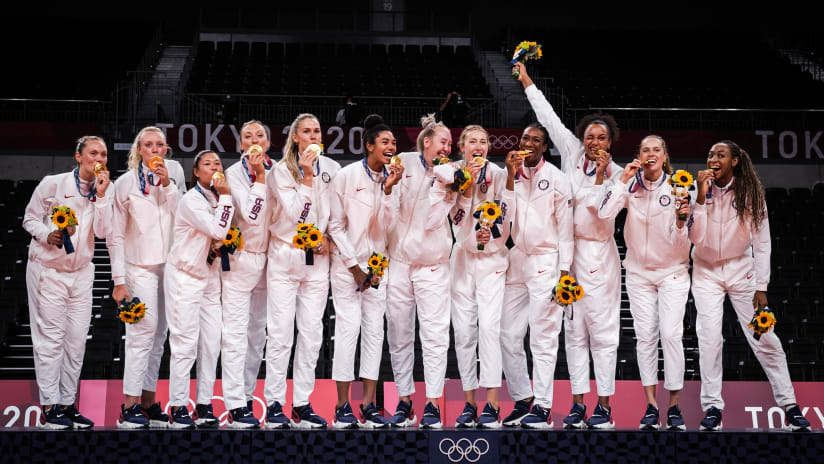The United States’ 12-strong women’s team seized their first Olympic gold medal win in Tokyo from July 24-August 8 after previously claiming three silver and two bronze medals at the quadrennial.
United States: 12-strong
Looking back at USA’s journey to the top of the Olympic podium
Published 07:05, 14 Aug 2021

The journey was a long one for the USA women’s volleyball programme at the Olympics. They had previously played in 11 editions, including their appearances in nine consecutive Games without winning a gold medal.
“There’s been a long history in our programme trying to achieve this. To be where we are now, we wouldn’t be in this position without the women who have come before us. I am so grateful that we can stand on their shoulders and be as successful as we are and hope to set the standard for the US women’s national team. I hope this gets the ball rolling for more gold medals in our future,” USA setter Jordyn Poulter said.
A key milestone in the development of the USA team was the appointment of Olympic medallist Karch Kiraly as head coach, who changed the team's destiny by leading the programme to its biggest success in history.
Kiraly was also part of the programme at the London 2012 Games, as an assistant coach, but after his appointment as head coach, he led USA to victory at the 2014 FIVB Volleyball Women’s World Championship, a bronze medal at Rio 2016 and silver medals at the 2017 FIVB Volleyball World Grand Champions Cup and 2019 FIVB Volleyball World Cup.
Kiraly set his sights on gold in Tokyo, but the process took years to complete. USA’s dominance at the FIVB Volleyball Nations League was a sign of things to come. The team claimed the title in three consecutive editions in the build up to the Olympics this year.
At the VNL, Kiraly was able to work with different options to fine tune his team for the Olympics. After years of selecting varying combinations of players, Kiraly found his 12-strong team for the Olympics: Jordan Larson, Foluke Akinradewo, Michelle Bartsch-Hackley, Annie Drews, Micha Hancock, Kim Hill, Chiaka Ogbogu, Jordyn Poulter, Kelsey Robinson, Jordan Thompson, Haleigh Washington and Justine Wong-Orantes.
But it took a village to achieve the team's success in Tokyo, including assistant coaches, a scouting and statistics team, conditioning coaches and even consultants all teaming up and helping USA get through the pandemic by building chemistry in the team.
“We actually hired a consultant for our team. She was a softball coach, and her name is Sue Enquist. She came in to make us become a team as we were functioning as a bunch of individuals,” captain Larson said.
“We didn’t know how to function as a team. We have in the team the youngest player at 23 and oldest at 34, so how can we all come together as one and figure out how to be on the same page? Sue did a great job leading that and having those conversations via Zoom when we were all over the world.”
After their successful VNL campaign in the Italian city of Rimini earlier this year, USA showed a lot of determination in Tokyo. Team USA had a 4-1 record in Pool B in the preliminary round, when they beat Argentina and China in straight sets, got the better of Turkey and Italy in five-setters and dropped one match to a ROC side performing very well at the serve.
In those last two matches with ROC and Italy, they lost two of their starters because of ankle sprain injuries. First was Thompson in the ROC match and then Poulter in the Italy match. Fortunately, both were nursed back to health and suited up again for the knockout round matches.
Drews and Hancock stepped in while their two teammates were injured, demonstrating the depth of the USA squad.
By the time the knockout round started, USA's players were all fit again and showing how determined they were. They defeated the Dominican Republic in straight sets in the quarterfinals, then Poulter’s return in the semifinals helped them to victory against their Rio 2016 semifinal rivals Serbia in straight sets.
USA faced an undefeated Brazil side in the gold medal match. The North Americans were focused and dictated the tempo throughout the match. Drews, Bartsch-Hackley and Larson led the team to a 3-0 (25-21, 25-20, 25-14) victory to claim their very first Olympic gold medal.
“Obviously with our team, anybody can play. The people that are on the bench are all stars and are getting high-end contracts overseas. So how do these players have selflessness enough to allow other players to step in their place when that could be them? How do you find give and take?” Larson asked.
“Even the girls back home, we talk about a training group of 23. Any of those girls could be on this Olympic team, so how do we create an environment that’s still ‘My success is your success and it’s our success.’ We try to have those conversations.”
And each member of the team was never shy to aim at gold.
“It is one of the most vulnerable positions you can put yourself in as an athlete, to put a goal out there that people can hold you to. We talked about how we were here to do great things and hard things. Every single person on this team, staff included, was here to do the hardest thing, which was win a gold medal,” Poulter said.
“It shows what kind of group we have. Every single person talked about chasing gold. I think it’s the bravest thing you can do, is put your goal out there and chase it and then achieve it. The whole tournament we talked about being 12 strong, the 12 of us on the team. Even if they fall short sometimes, we will have their back. I think it is one of the most freeing things you can have as an athlete. I think you saw that support with our team.”
Kiraly, who added another incredible feat to his extensive catalogue of achievements, described this victory as his sweetest.
“I'll use two words: 'Grit' and 'grind'. They have this fierce, strong spirit and an ability to keep trying when things are hard. Those two g-words were certainly a part of who we were here. Grit and grind,” he said.
“Emotionally, this was the most powerful. The reason was all the suffering that the great players, teams and coaches in this programme have gone through. They were so close in 1984, lost in Beijing to Brazil in 2008, they were up 1-0 against Brazil in London and lost again. All that suffering, anguish and heartbreak makes it that much sweeter.”







